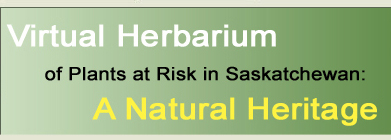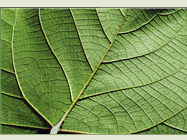|
| Euphrasia subarctica
Raup |
|
| |
| TAXONOMY |
| |
| Family: |
Scrophulariaceae |
| Genus: |
Euphrasia |
| |
| Species Synonyms: |
Euphrasia arctica var. disjuncta
sensu (Fern. & Wieg.) Cronq.
Euphrasia arctica
var. dolosa (Boivin) Boivin
Euphrasia disjuncta var.
dolosa Boivin
Euphrasia pennellii Callen p.p. |
| Common Names: |
arctic eyebright |
| |
| DISTRIBUTION |
| |
| Canada: |
Yukon – southern Mackenzie, south to British
Columbia – western Alberta, northern Saskatchewan – northern
Manitoba |
| Saskatchewan: |
northern Saskatchewan; Lake Athabasca, Stony Rapids,
La Loche, Buffalo Narrows, Southend, Pita Lake, Leaf Rapids |
| Ecoregion: |
Mid-Boreal Upland, Churchill River Upland, Athabasca
Plain, Tazin Lake Upland |
| |
| HABITAT |
| |
| Saskatchewan: |
woods, clearings, rocky shores, and sedge-fen
borders |
| Associated species: |
common plantain, Kentucky blue, pineappleweed,
white clover |
| |
| RARITY STATUS |
| |
Provincial
Status According
to Harms (2003): |
Threatened |
| Nature Conservancy
Status: |
G5Q S1S2 |
Saskatchewan
Species at
Risk Status: |
None |
| COSEWIC Status:
|
None |
| |
| Arctic eyebright
is threatened because it is rare or uncommon in Saskatchewan. No immediate
threats are known but may occur in the future. |
| |
| SPECIES
DESCRIPTION |
| |
| Growth Habit: |
probably a root parasite |
| Height: |
5 – 30 cm |
| Stems: |
annual, slender, simple or branched, branches
ascending, hairy |
| Leaves: |
opposite, in 3 to 10 pairs, sessile, 2 –
18 mm long, oval or round, hairy, palmately veined, margin with three to
five teeth on either side |
| Inflorescence: |
flowers solitary in the leaf axils |
| Flowers: |
sepals unequally 4-lobed, hairy; petals 3 –
4 mm long, white with purple lines and a yellow spot, upper lip concave,
slightly 2-lobed, lower slip spreading; stamens 4 |
| Fruits: |
capsule flattened, hairy |
| |
| SCROPHULARIACEAE
KEY FOR GENERA FOUND IN SASKATCHEWAN |
| |
| 1 Stamens 2 |
2 |
| 1 Stamens 4 or 5 |
4 |
| |
|
2 Leaves alternate or all basal; petals
absent
|
Besseya |
| 2 Leaves opposite; petals present |
3 |
| |
|
| 3 Sepals 4-lobed; stamens exserted |
Veronica |
| 3 Sepals 5-lobed; stamens inserted |
Gratiola |
| |
|
| 4 Leaves all basal |
5 |
| 4 At least some stem leaves |
6 |
| |
|
| 5 Flowers solitary; petals tubular;
leaves usually entire or toothed |
Limosella |
| 5 Flowers in spike-like clusters;
petals 2-lipped; leaves pinnately lobed or cleft |
Pedicularis |
| |
|
| 6 Petals spurred |
7 |
| 6 Petals not spurred |
9 |
| |
|
| 7 Petals bluish purple, 4.5 –
6 mm long, excluding spur; flowers solitary in leaf axils |
Chaenorrhinum |
| 7 Petals yellow or blue, 10 –
13 mm long, excluding spur; flowers in terminal unbranched clusters |
8 |
| |
|
| 8 Slender annual, 10 – 40 cm
tall; petals blue |
Nuttallanthus |
| 8 Stout perennial, 30 – 100
cm tall; petals yellow and orange |
Linaria |
| |
|
| 9 Floral bracts coloured, concealing
flowers |
Castilleja |
| 9 Floral bracts green, flowers evident |
10 |
| |
|
| 10 Stem leaves alternate |
11 |
| 10 Stem leaves opposite |
13 |
| |
|
| 11 Stamens 5, filaments long-hairy;
petals regular, distinctly 5-lobed |
Verbascum |
| 11 Stamens 4, filaments hairless;
corolla irregular, indistinctly 5-lobed |
12 |
| |
|
| 12 Basal leaves absent; stem leaves
usually entire, linear; flowers yellow; stamens not enclosed by upper lip |
Orthocarpus |
| 12 Basal leaves commonly present;
stem leaves toothed or pinnately lobed; flowers yellow to white or purple;
stamens enclosed by upper lip |
Pedicularis |
| |
|
| 13 Sepals 4-lobed |
14 |
| 13 Sepals 5-lobed |
17 |
| |
|
| 14 Petals pink or purple |
Odontites |
| 14 Petals white to yellow |
15 |
| |
|
| 15 Sepals about 1 cm long in flower,
enlarged, veiny, and membranous in fruit |
Rhinanthus |
| 15 Sepals less than 1 cm long in flower,
not enlarged in fruit |
16 |
| |
|
| 16 Leaves 2 – 10 mm long, lobed,
upper leaves sessile |
Euphrasia |
| 16 Leaves 10 – 40 mm long, more
or less entire, upper leaves stalked |
Melampyrum |
| |
|
| 17 Sterile stamens present, filamentous |
Penstemon |
| 17 Sterile stamens absent or scale-like |
18 |
| |
|
| 18 Flowers blue; stamens enclosed
by lower lip; upper stem leaves whorled |
Collinsia |
| 18 Flowers greenish to yellow or reddish;
stamens not enclosed by lower lip; stem leaves all opposite |
19 |
| |
|
| 19 Petals green with reddish or purple
tinge; flowers less conspicuous, less than 1 cm long; sepals segments deeply
parted |
Scrophularia |
| 19 Petals yellow or pinkish red; flowers
large and showy, 1 – 4 cm long; sepal segments united into tube |
Mimulus |
|






